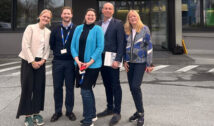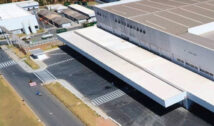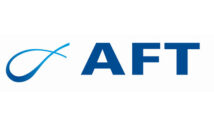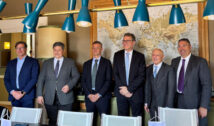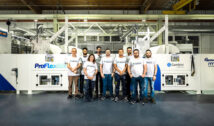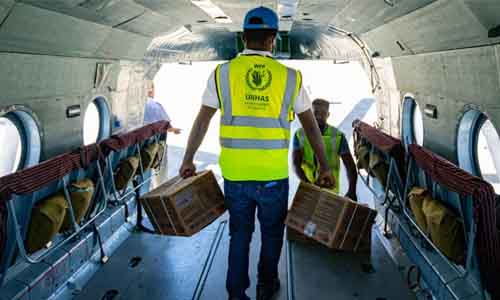
As part of our three-year partnership with the UN World Food Programme, Nicole Unger and Susan Brunner have been working with Carole Manceau, Packaging Expert at WFP, to help optimise WFP’s food aid packaging while minimising environmental impacts.
According to the World Food Programme (WFP), up to 783 million people go to bed hungry every night, yet a third of all available food is lost or wasted every year. With the number of people affected by hunger on the rise since 2014, fit-for-purpose packaging plays a crucial role in protecting food and ensuring it arrives safely, securely and sustainably.
The demands on food packaging are even higher in humanitarian emergencies. Packaging protects food aid items during the long and complex supply chains of humanitarian operations, often withstanding challenging climate and transport conditions, and extended storage times in order to reach those most in need.
Since 2019, Mondi has been partnering with WFP – the world’s largest humanitarian organisation fighting hunger around the world – to help optimise WFP’s food packaging, while minimising the environmental impacts of its life-saving operations. Applying its technical knowledge and expertise, Mondi has been helping WFP ensure fit-for-purpose and more sustainably designed packaging is used throughout the humanitarian supply chain. Now in the third year of the partnership, Mondi and WFP have developed a structured decision framework. Taking a life cycle thinking approach, the framework will help WFP make packaging decisions based on both effectiveness and sustainability – delivering real impact on the ground.
Our life cycle decision framework
The decision framework takes a life cycle-based approach to support WFP and its suppliers in making more informed packaging decisions that help curb food loss, waste, and environmental impacts.
Typically, a life cycle assessment (LCA), as defined by ISO standards, is used to evaluate the environmental impacts of a product, process or service from its production phase all the way through to its distribution and, finally, disposal. But WFP’s worldwide supply chain involves a wide range of uncertainties and specificities, as well as cost and time constraints, which means there are more complex decisions WFP must take into consideration when deciding the packaging type. This decision framework therefore goes a step further than a traditional LCA – incorporating environmental, social and economic factors, taking into account a wide range of complex supply chain challenges.
So, what makes WFP’s supply chain so complex? Take transport as an example. The conditions under which food is moved along WFP’s supply chain are often hard to predict. Extreme weather or stress from complicated journeys to remote or conflict-affected areas can cause damage to food items during transport. These factors are critical as WFP often relies on airdrops to reach hard-to-access and vulnerable communities. This makes it harder to decide the optimal packaging type. This is where the decision framework comes in – guiding WFP and its suppliers in making packaging judgements which incorporate both performance and sustainability considerations.
WFP must also overcome other challenges such as inconsistent or non-existing local recycling infrastructure, which leads to lower recycling rates and adds to the existing challenge of lack of accurate data on disposal methods. General low levels of data across the value chain present a significant challenge for WFP but represent a challenge that affects the whole humanitarian sector. Insufficient data makes it difficult for WFP to determine the actual life cycle impacts of its packaging and therefore to make informed packaging decisions that will optimise environmental, social and economic impacts.
Overcoming these challenges is a priority for Mondi and WFP. They are a driving force behind the development of the decision framework and will allow WFP to ensure and maximise the overall positive impact of its supply chain.
Future outlook
The ultimate goal of this partnership is to promote benefits for the wider industry by working to increase effectiveness and sustainability along humanitarian supply chains and beyond. As WFP and Mondi develop and test the streamlined life cycle-based decision framework, they look to encourage collective action across the humanitarian sector, including inter-agency collaboration, to accelerate progress towards a world without hunger.
Ending hunger is a monumental challenge, and that is why WFP collaborates with other organisations in the humanitarian sector and beyond to share expertise and tools – delivering tangible change and real impact for people and the planet



